That booklovers can commit crimes in pursuit of their passion is perhaps no surprise. The rush of adrenalin when you see a particular book can be powerful. It was in Peter L Stern's bookshop in downtown Boston that I saw and handled a copy of "A Thin Ghost and Others" by M R James. Nothing special in that, but this had the bookplate of H P Lovecraft on the front pastedown, with his dated signature also on the flyleaf. The price was, of course, way above anything remotely practicable and so, following a long talk with the good Mr Stern in which I held the book and turned the pages once turned by HPL himself, I went on my way. But then, for the record, let me recall that in a local bookshop not far from our home, I found a first edition of Bram Stoker's "Dracula's Guest" with its famous dustwrapper more or less complete, and all for £3.50.

The American author, John Dunning, is a particular favourite. After a variety of jobs associated with journalism and politics he opened the Old Algonquin Bookstore in Denver Colorado in 1984. This is now only an internet business, but in 1992 he published his first novel featuring Cliff Janeway, a hard edged former cop who runs a bookstore in Denver. This was "Booked to Die", the first of five novels so far featuring Janeway. "Booked to Die" begins with the murder of a bookscout and events rapidly escalate as Janeway goes in pursuit of his killer.
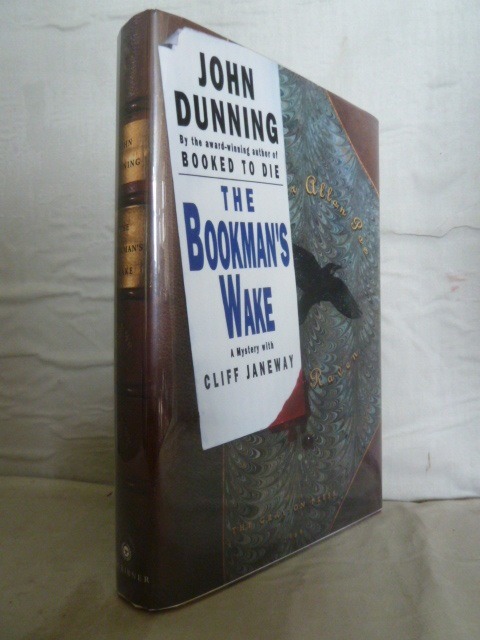
"The Bookman's Wake" was published in 1995 and here Janeway is commissioned to find a girl-on-the-run, suspected of having stolen a copy of the fabulously rare Grayson Press Edition of Poe's "The Raven". Janeway suspects all is not what it seems but heads off to Taos, New Mexico, in pursuit. In this book we are into the world of private presses and wealthy collectors with much fascinating detail of the book world.
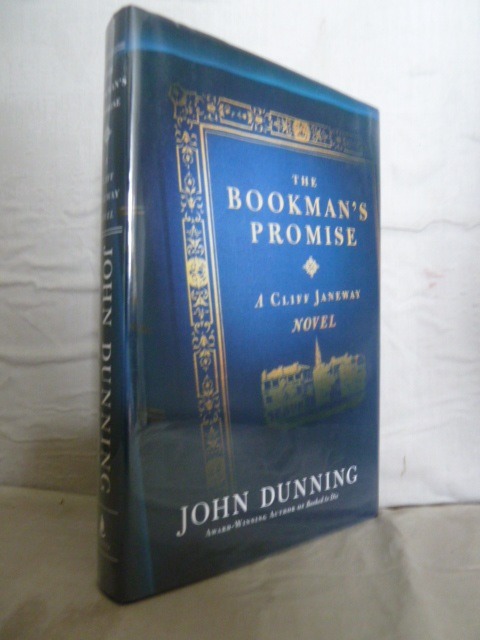
In "The Bookman's Promise" (2004), Janeway promises a dying woman that he will find her grandfather's lost collection of books and manuscripts of Sir Richard Burton. But others are also on the trail..... This novel introduces Erin d'Angelo, a lawyer, who will become his partner in the next novel.

"The Sign of the Book" (2005) is perhaps my favourite. The book world is suspicious about the number of signed first editions turning up at book fairs. Erin has persuaded Janeway to try to help a friend of her's, Laura Marshall, who has admitted to shooting her book collector husband. The two stories merge when it turns out that Laura's son, who is autistic, can perfectly reproduce any signature he sees and has been faking signatures and fooling the booksellers.

"The Bookwoman's Last Fling" (2006) is the last published. In this story Janeway is asked to value a book collection following the death of its owner. Janeway had been aware of this collection, mainly juvenilia, before and is surprised to find that many key books are missing and have been replaced by cheaper copies of the same titles. But this is no simple cataloguing error; Janeway suspects dark deeds, including murder.
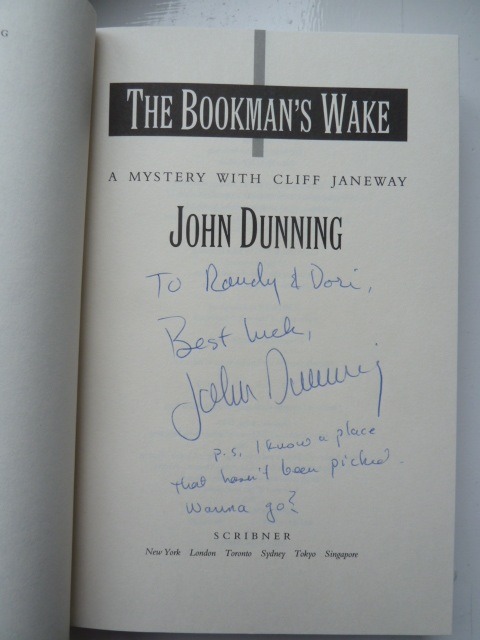
All these books are steeped in booklore and written by a bookseller and lover of books. I am proud to have a full set, each signed by the author, and picked up on travels in America, the last being mailed from Bella Luna Books in Colorado, who obtained the signature for me.
I hope there are more; the Old Algonquin Bookstore website reports that John Dunning is recovering from surgery but does suggest that a return of Cliff Janeway could be imminent. All lovers of bookshops and murder mysteries will hope so.

Amongst a number of other bibliomysteries on the shelves, I can recommend Bartholemew Gill's "Death of a Joyce Scholar" (1989). This is a literary mystery in which a prominent Joyce scholar is murdered on Bloomsday in Dublin, hence combining three of my favourite elements, Dublin, "Ulysses" and the wonderful celebration of Bloomsday (which we have been fortunate enough to participate in on two occasions). Inspector Peter McGarr of the Garda attempts to solve the mystery, but is hampered from the outset because (believe it or not) he has never read "Ulysses".

"A Cracking of Spines" (1981) is by a bookseller, Roy Harley Lewis. His hero Matthew Coll (himself an antiquarian book dealer) is commissioned by the Antiquarian Booksellers Association to investigate a number of recent thefts of rare books. Again, the story is enhanced by the depth of knowledge of the trade possessed by the author.
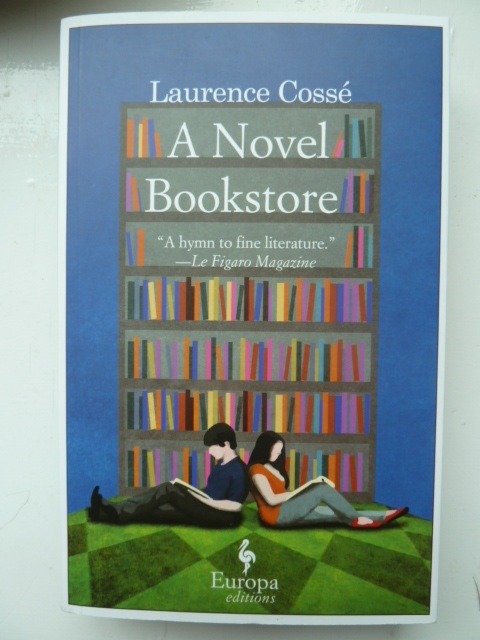
A more recent work is Laurence Cosse's "A Novel Bookstore" (2009), translated from the French. The Good Novel Bookstore exists to sell only good books, chosen by a Committee with a view to improving the reading matter of the people. However, other forces threatened by this move (i.e publishers of trashy novels) use any number of dirty tricks (including murdering menbers of the Committee) to stifle the venture. A similar, though much more gentle, example of attempts to shut down a bookshop is provided in Penelope Fitzgerald's wonderful short novel "The Bookshop" (1978). In this book a widow decides to open a bookshop in the marvellously named East Anglian town of "Hardborough". There is much local prejudice against her, chiefly from a prominent citizen who had wished to establish an Arts Centre in the building occupied by the bookshop. Displaying "Lolita" in the window does not help either. Eventually the hapless Florence Green is driven out, having to accept that "the town in which she had lived for ten years did not want a bookshop", possibly the saddest line in English literature.
Truth is often stranger than fiction and in the world of book crime this is certainly true. Obsessive book collecting has led to some quite astonishing crime waves. Leaving aside for a later blog the incredible life of that prince of forgers Thomas J Wise, I will briefly mention two books dealing with book theft that make riveting reading.

Nicholas S Basbanes's wonderful study of bibliomania "A Gentle Madness" deals with all manner of obsessive collectors throughout the whole history of the printed book. It is only one of this author's magnificent sequence of books about books, libraries, the future of books and related matters. However, it is in "A Gentle Madness" that he details the career of Stephen Blumberg, who was arrested in Iowa in 1990 for book theft. In his career Blumberg had stolen some 23,000 books from 268 libraries over 45 US states and had amassed an incredible collection of rare books, including a superb Americana collection, with many unique items relating to early colonial history. Basbanes was granted unique access to interview Blumberg pending his trial (at which he received a custodial sentence ) and provides a fascinating insight into the obsessive collector's mind.
One of the things that makes this story so fascinating is that the libraries involved (practically every great American library) often were totally unaware that the books were missing until the police recovered them. Some even would not admit the loss to save the embarrasment of confessing that some priceless work had vanished many years earlier without them noticing. You almost have sympathy with Blumberg, who did really value the books. His methods were amazing; police found in his store hundreds of keys to library offices and secure collections that he had copied during his library visits. He often gained access to rooms and then threw books out of windows into flower borders or other areas where he could pick them up when he left the building.

A similar tale is told in Allison Hoover Bartlett's "The Man Who Loved Books Too Much" (2009). This is a rather special book for us because we bought it from Ken Sanders Rare Books of Salt Lake City. Now Ken Sanders spent a number of years as the security chair of the Antiquarian Booksellers Association of America. In this role he was asked to investigate a number of apparently related book thefts from dealers across the country. The story is grippingly told and brings in a number of booksellers we have personally visited in the USA and who helped Sanders with his search. Eventually the thief, John Charles Gilkey, was caught by Sanders and sent to San Quentin jail. Again, like Basbanes, Bartlett explores the world of book collecting and the minds of those whose passion turns into obsessive crime. Our copy is signed both by the author and by Ken Sanders, who has added 'with greetings from the bibliodective', giving it a special place in our bookish crime collection.
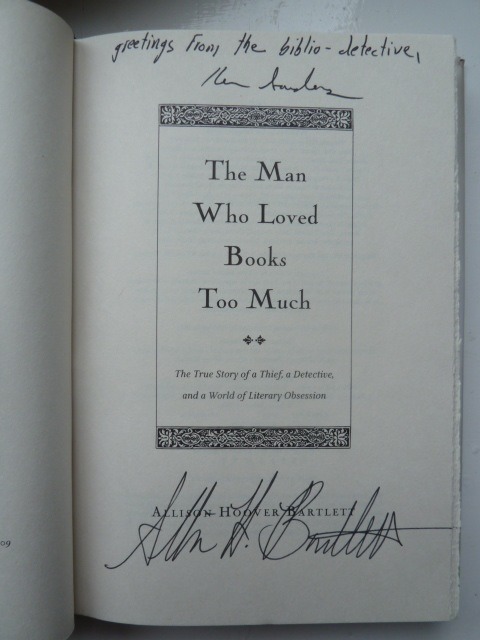
So, in a happy conjunction, the worlds of mystery writing and bibliographic history meet in our collection of books about books. I cannot imagine the urge that impells collectors to commit crimes to obtain longed-for items. For, after all, for the true collector the joy is in the hunt and the books in our own collection and those left behind in bookshops all over the world are all part of one whole library of the imagination and, of course, exist side by side in Jorge Luis Borges' 'Library of Babel'.
- Posted using BlogPress from my iPad

No comments:
Post a Comment
Please feel free to comment.